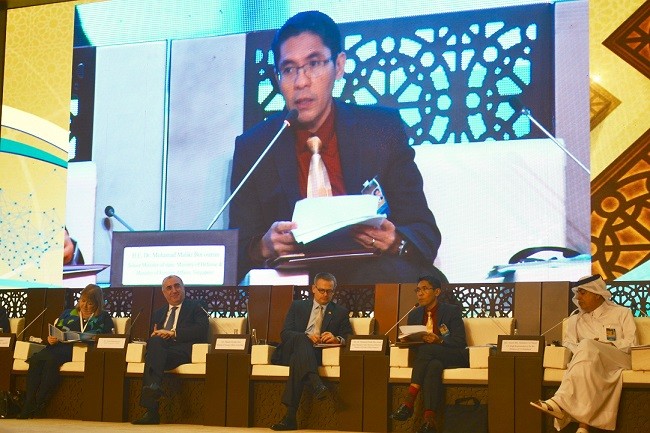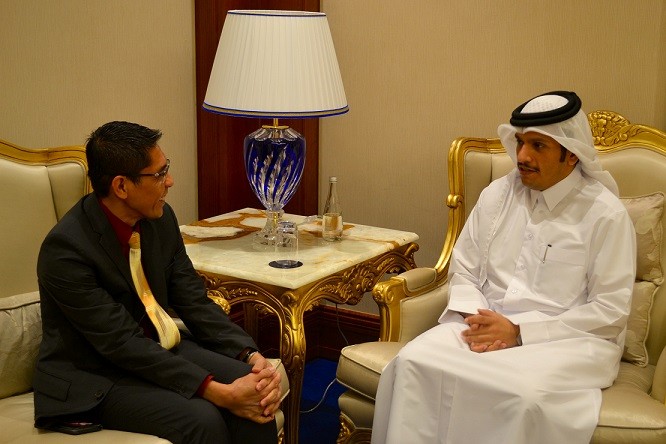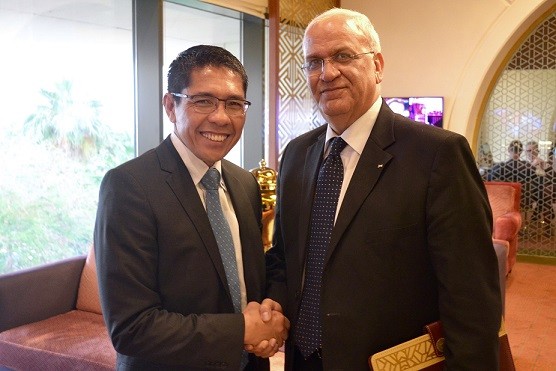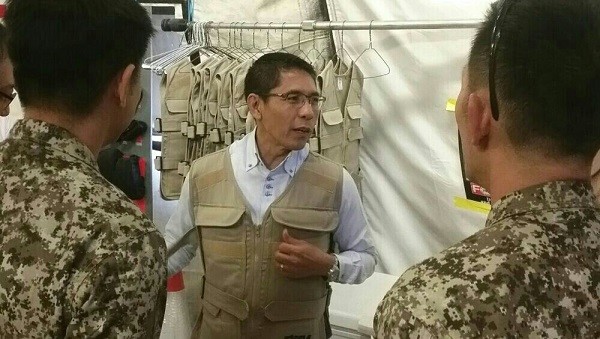MFA Press Statement: Visit by SMS Dr Mohamad Maliki Osman to the State of Qatar, 20-22 May 2016
-
22 May 2016
Senior Minister of State (SMS), Ministry of Defence and Ministry of Foreign Affairs Dr Mohamad Maliki Osman attended the 16th Doha Forum from 20 to 22 May 2016. SMS Maliki met His Highness ...
This article has been migrated from an earlier version of the site and may display formatting inconsistencies.
Senior Minister of State (SMS), Ministry of Defence and Ministry of Foreign Affairs Dr Mohamad Maliki Osman attended the 16th Doha Forum from 20 to 22 May 2016. SMS Maliki met His Highness Sheikh Tamim Bin Hamad Al Thani, Emir of the State of Qatar at the Opening Session, and reaffirmed our excellent bilateral relations. At the Forum’s first Plenary Session on “Security”, SMS Maliki spoke on the terrorism threat in Southeast Asia and efforts at combating this threat. The full text of SMS Maliki’s speech is as attached.
SMS Maliki called on Minister of Foreign Affairs of Qatar His Excellency Sheikh Mohammed Bin Abdulrahman Bin Jassim Al Thani and reaffirmed the excellent bilateral relations between Qatar and Singapore. They noted with satisfaction the progress in bilateral cooperation following the 7th High Level Joint Committee (HLJC) held in Doha in March 2016. SMS Maliki conveyed Minister for Foreign Affairs Dr Vivian Balakrishnan’s invitation letter to His Excellency Sheikh Mohammed to make an Official Visit to Singapore and deliver the 2016 S R Nathan Lecture at the National University of Singapore.
SMS Maliki also called on Minister of Administrative Development, Labour and Social Affairs of Qatar His Excellency Dr Issa Bin Saad Al Jafali Al Nuaimi to express our appreciation to Qatar for hosting the Qatar-Singapore Regional Training Centre for Public Administration (RTCPA)[1] since 2006. SMS Maliki and His Excellency Dr Issa discussed ways to further raise participation levels at the RTCPA.
At the sidelines of the 16th Doha Forum, SMS Maliki also met separately Minister of Foreign Affairs and Worship of Costa Rica His Excellency Manuel Gonzalez Sanz and Deputy Foreign Minister of Georgia His Excellency David Jalagania. They reaffirmed the good bilateral relations, and discussed possibilities for further cooperation between Costa Rica and Georgia respectively.
SMS Maliki also met Palestine Liberation Organisation Secretary-General and Palestinian Chief Negotiator His Excellency Dr Saeb Erekat on 21 May 2016. They discussed the follow-ups arising from Prime Minister Lee Hsien Loong’s visit to Ramallah last month, including Singapore’s offer to assist the Palestinian people in vocational training and skills building under its Enhanced Technical Assistance Package. His Excellency Dr Erekat conveyed his appreciation for Singapore’s efforts and welcomed SMS Maliki to visit Ramallah. SMS Maliki also reiterated Singapore’s support for the two-state solution and welcomed the French initiative to convene a conference on 3 June 2016 to discuss the Middle East Peace Process. He expressed the hope that both sides would resume direct negotiations as soon as possible.
On 21 May 2016, SMS Maliki visited the Republic of Singapore Air Force (RSAF)’s KC-135R detachment. SMS Maliki was briefed on the SAF operations and interacted with the RSAF personnel. SMS Maliki also met Combined Force Air Component Commander Lieutenant General Charles Q. Brown Jr and exchanged views on the regional security situation and the international coalition’s efforts to combat the Islamic State (IS).
SMS Maliki departs for Singapore this evening.
. . . . .
MINISTRY OF FOREIGN AFFAIRS
SINGAPORE
22 MAY 2016
-----------------------------------------------------------------------------------------------------------------------------------------------------------
SPEECH BY SMS DR MOHAMAD MALIKI OSMAN AT THE 16TH DOHA FORUM’S FIRST PLENERAY SESSION, AT SHERATON HOTEL, 22 MARCH 2016
It is an honour for me to be here. I thank the State of Qatar for the kind invitation to the 16th Doha Forum and for its gracious hospitality.
2 The theme for this year’s Forum, “Stability and Prosperity for All” is indeed very apt. I am not an expert in the Middle East. However, I will share with you our experiences and our perspective on how we see the security situation in the Middle East and its impact on Southeast Asia.
3 We are worried about the challenging security situation in this region, especially in Syria, Yemen, Libya and Iraq. We need to resolve these conflicts urgently, as terrorist groups such as Al Qaeda and the Islamic State (IS) have exploited the security vacuum and the collapse of social order to establish a reign of violence, oppression and fear.
4 The expansive network of terrorist groups has deeply impacted Southeast Asia. IS’ global reach has surpassed that of Al Qaeda. It has recruited more than 36,000 foreigners, including at least 1,000 nationals from Malaysia, Indonesia, the Philippines and a few from Singapore. IS has even set up a battalion for Southeast Asian fighters called Katibah Nusantara lid Daulah Islamiyah (Malay Archipelago Unit for the Islamic State in Iraq and Syria).
5 Terrorism is not new to Southeast Asia. The Al-Qaeda-linked Jemaah Islamiyah (JI) was formed in the 1990s with the intention of setting up a Daulah Islamiyah (Islamic state) through violent means. JI was responsible for several bombings in Indonesia in the mid-2000s and even planned to bomb specific targets in Singapore but their plans were thwarted with the arrest of 13 JI members in December 2001.
6 But our biggest concern is that IS has even larger ambitions and more resources. IS has exploited the existing terrorist networks, and declared its intention to set up a wilayat (province) in Southeast Asia. It has sought to recruit Southeast Asians through slick media productions, including mobile video games, that appeal to the restless and radicalised individuals, particularly the youth. Southeast Asia is fertile ground for IS. Many people move to our region for work and leisure. Singapore has to be alert against the radicalisation of our migrant population as well. In April 2016, we arrested eight Bangladeshi nationals and months earlier deported 27 other Bangladeshi nationals for terrorism-related activities.
7 The global brand name of IS is attractive to homegrown self-radicalised individuals, and regional militant groups seeking to gain attention for themselves even when they have no direct linkages with IS or understand their cause. Militant groups, many of whom are small in their respective countries, feel that they are “backing the winner” – this increases their prestige and sense of importance through IS. A study showed that 26 militant groups in Indonesia, nine in the Philippines, and five in Malaysia have either pledged allegiance to IS or declared support for it. In 2014, radical Indonesian cleric Abu Bakar Bashir very publicly pledged allegiance to IS from prison where he is serving a sentence for terrorism offences. These have contributed to the perception of a growing IS presence in the region and could encourage even more to join their ranks.
8 There are also concerns that existing terrorist links may have expanded beyond our region. There are indications that Uighurs from China could be travelling to Southeast Asia to join regional terrorist groups. In July 2015, four Chinese Uighurs were sentenced by Indonesian courts for allegedly trying to meet Santoso, leader of the Mujahideen Indonesia Timor (MIT), which has pledged its allegiance to IS. Indonesian security forces also killed two Chinese Uighurs who had joined Santoso in Sulawesi in March 2016. Malaysia has also successfully foiled several IS plots, and arrested at least 170 individuals for suspected extremist activities, including some with links to the Malaysian military and police. IS has also declared its intention to carry out revenge attacks on governments which have cracked down on its members. As recently as a few days ago, IS released a video declaring Malaysia as “taghut” and announced plans to lead a charge against Malaysia. Southeast Asia saw its first IS-linked terrorist attack in Jakarta in January this year. Indeed, IS fighters returning from the conflicts in the Middle East are a threat to our society given their experience and networks they have established there.
9 There are no easy solutions to countering terrorism. Cooperation between countries is critical in three areas. First, security agencies should work closely to exchange information on terrorist networks. Singapore has stepped up cooperation with Malaysia and Indonesia, and partners outside the region such as Australia and the US. In November 2015, we denied entry to two Indonesians who claimed to be tourists but later admitted that they were going to Syria to join IS. Both were deported to Indonesia. Besides intelligence sharing, our security agencies should also exchange ideas on how to counter the spread of extremist ideology through the internet and social media.
10 Second, cooperation in the multinational coalition against IS. Singapore was the first Southeast Asian country to contribute military assets to the coalition. These included an intelligence planner and an imagery analysis team to the Combined Joint Task Force in Kuwait, and a KC-135R tanker, which refuelled 142 coalition aircraft in 52 sorties during last year’s operations. With the strong support of the Qatari government, Singapore is presently deploying the second KC-135R detachment. We are grateful to other partners in the region such as Bahrain, UAE, Kuwait and Saudi Arabia for overflight and landing clearances. This is a tangible example of the importance and benefits of close cooperation.
11 Third, we need to counter the extremist ideology that fuels the militants’ raison d’être. There is an urgent need to develop a counter-narrative to extremist propaganda. Religious teachers and institutions bear the heavy responsibility of teaching the right theology. We thus welcome the Open Letter to Al-Baghadi of September 2014 signed by many prominent Islamic clerics, scholars and theologians, which exposed the fallacies of IS’ theology. This open letter must reach out to more Muslims in digestible bits that will enable them to understand the true message and reject the extreme views of Islam propagated by IS.
12 At the national level, there is no room for complacency. The best form of prevention is to build a resilient society where all its members feel a sense of belonging.
13 This is why since independence in 1965, Singapore has worked tirelessly to build a harmonious multi-racial, multi-cultural and multi-religious society, and to prevent the formation of racial and religious enclaves, marginalisation, and discrimination. We actively manage our public spaces so that all religions and races can co-exist and interact on an equal footing. A comprehensive network of grassroots, community self-help groups, inter-religious and government organisations and initiatives, have helped to foster national identity and mutual tolerance and respect.
14 We also need to monitor closely the use of internet and social media to spread extremist propaganda and untruths. We must prevent divisive roots from proliferating, especially over social media. Singaporeans are aware of the need to air their views in a sensitive and responsible way, and would speak out against divisive messages and untruths. To counter false ideologies and teachings, the Muslim community in Singapore established the Religious Rehabilitation Group (RRG), which raises awareness within the community through pamphlets and videos. RRG has also provided religious counselling to radicalised individuals and we are encouraged that the rate of recidivism has been low.
15 At the international level, Singapore hosts the annual Shangri-La Dialogue (SLD), the pre-eminent regional security forum to enhance dialogue and exchange views amongst countries. Besides pressing regional security issues such as the South China Sea, this year’s SLD will also be discussing defence policy-making and enhancing cooperation against terrorism in Asia.
16 Terrorism is just one of the many types of security threats we all face today. The challenges are complex and do not fit easily into our traditional security paradigm. It is not possible to win this fight alone. As our Arab friends say, “Fee Il-ti-had –ku-wa” (In unity there is strength). There are many proven examples of how the international community has worked well together. For example, the multinational counter-piracy task force in the Gulf of Aden, which is headquartered in Bahrain, has successfully reduced piracy attacks. Singapore is honoured to command the Combined Task Force (CTF) for the fourth time. Similarly, we stand committed to work with our friends in the Middle East to build a stable and prosperous world for all. Thank you.
. . . . .
[1] The Qatar-Singapore RTCPA was established in November 2006, under the framework of the Asia-Middle East Dialogue (AMED). Since then, more than 485 officials from 39 AMED member countries have benefitted from training courses conducted at the RTCPA in the areas of governance, commerce, and urban development, among others.




